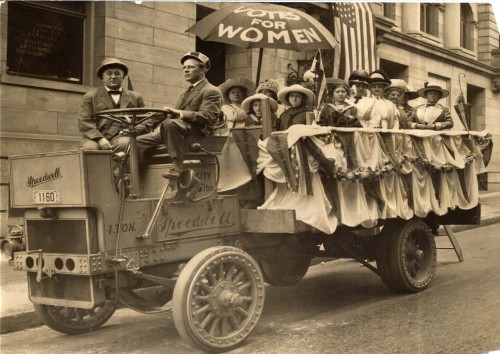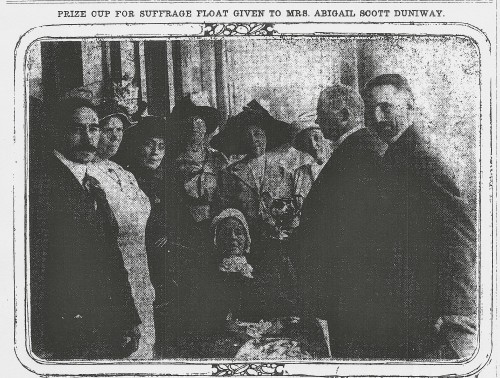June 1912: Suffrage Floats, Parades, and Picnics—and Women Vote in School Elections
June 1912 brought summer to Oregon and suffragists took their message to summer events. And they also voted in school elections.
June brought the Rose Festival to Portland. Esther Pohl Lovejoy and Pike Davis used the opportunity to sell sandwiches and suffrage by staffing the Suffrage Lunch Wagon with food and creating a rolling advertisement for votes for women from 12:00 to 2:00 each day of the festival.

Suffrage Lunch Wagon, June 1912, Courtesy Amy Khedouri.
The Oregon State Suffrage Campaign entered a float in the “float class of the horse and vehicle parade of the Rose Festival” and won first prize (“Pioneer Gets Cup,” Oregonian, June 18, 1912, 18).
The Oregonian printed an image of suffragists and Rose Parade officials delivering the first prize cup to Abigail Scott Duniway, who was ill and confined to her home. We’re fortunate that the paper printed names in the caption. Archivists—do you have this image in your collections??

“Prize Cup for Suffrage Float Given to Mrs. Abigail Scott Duniway,” Oregonian June 18, 1912, 18. “Mrs. Duniway in Center of Group, Surrounded by Representatives of the Suffrage Association. From Left to Right Names Are as Follows: Rev. Albert Ehrgott, Chairman of the State Central Campaign Committee; Dr. Eugenia G. Little, Chairman of the Float Committee; Mrs. L.W. Therkelsen, of the State League; Mrs. A. King Wilson of the Women’s Clubs; Mrs. H. Waldo Coe, of the State League; Miss Emma Wold, of the College League; Dr. Emmet Drake, of the Rose Festival Association, and W. C. Duniway.”
Votes for women supporters in Oregon were working to gain support for the November 5, 1912 ballot measure that would provide full suffrage to the women of the state. But many women could vote in school elections. In 1878 the Oregon legislature passed a bill enabling all taxpayers in the state, regardless of gender, to vote in school elections. This was based on the idea that mothers with children and property in a school district had a stake in school board affairs and should be able to vote. Newspaper coverage of school elections in gives us a great sense of what that vote meant in 1912.
In Portland, school board candidates courted the woman’s vote. A recently-passed Corrupt Practices Act, designed to prevent undue influence over voters on Election Day, did not apply to school elections. So on June 17 “friends of both candidates” used cars to gather voters and bring them to the polls. According to this Oregonian article, “The automobiles were used principally in the outlying districts and were largely responsible for the heavy vote that was polled.” The candidates, of course, were banking on women and men who received a ride to vote for them and perhaps put pressure on them by asking about their choice ahead of time.
“Hundreds” of women came to the polls this way. But they were not just the objects of candidates’ reelection goals: they used the transportation for their own purposes. C. A. Ambrose, one of the drivers, said he “had no trouble finding plenty of women passengers” in the Woodlawn district throughout the afternoon. But “the trouble of it was they were very coy about indicating for whom they desired to vote until they were being returned to their homes. I am satisfied that some of my fair passengers did not vote for the candidate in whose interests I was working.”

“Beach Reelected to School Board,” Oregonian, June 18, 1912, 14.
In Madras, the June 17 school election presented different opportunities. L. R. Alderman, Superintendent of Public Instruction, published a notice to “To the Patrons of Oregon Schools” in the Madras Pioneer (thanks Oregon Digital Newspaper Project!). Alderman invited everyone to attend to take advantage of the election day and “of being together to talk over the problems of the schools.”
“The voting for director and clerk will take place at the school house,” he noted. “It should be remembered that women already have the privilege of suffrage in school elections. If all the women of the community will pack their lunch boxes, and assemble at the school house on the morning of June 17, I am confident that the men will be there also when the sun reaches the meridian. Of course, the members of the family under voting age will have to have dinner. So all will spread out their lunches under some pleasant shade, and enjoy dinner together.” Voting, Alderman said, would definitely not interfere with women’s family duties, a charge made by antisuffragists.
“After a good dinner all will be in the right frame of mind for electing the officers and discussing school affairs,” Alderman urged. “The patrons will have the opportunity to investigate the school house and grounds, and see what repairs are needed; whether the school house is property heated, lighted and ventilated, and what books and pictures are most needed. Let us make June 17 a red letter day for our district!”

L. R. Alderman, “To the Patrons of Oregon Schools,” Madras Pioneer, June 13, 1912, 2.
—Kimberly Jensen
Want to read more articles from Oregon suffrage campaigns? Click here
Permalink

